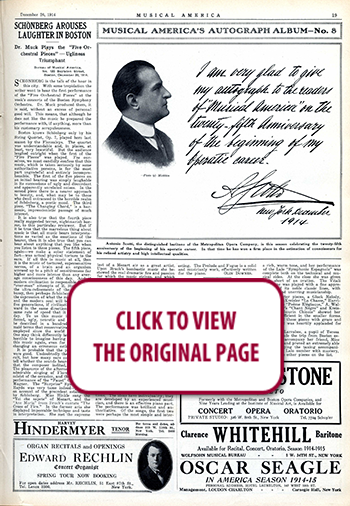 100 YEARS AGO...IN MUSICAL AMERICA (76)
100 YEARS AGO...IN MUSICAL AMERICA (76)
December 26, 1914
Page 19
SCHÖNBERG AROUSES LAUGHTER IN BOSTON

Dr. Muck Plays the “Five Orchestral Pieces”—Ugliness Triumphant
By OLIN DOWNES
Bureau of Musical America, No. 120 Boylston Street, Boston, December 20, 1914
SCHÖNBERG is the talk of the hour in this city. With some trepidation the writer went to hear the first performance of the “Five Orchestral Pieces” at the week’s concerts of the Boston Symphony Orchestra. Dr. Muck produced them, it is said, without an excess of personal good will. This means, that although he does not like the music he prepared the performance with, if anything, more than his customary scrupulousness.
Boston knows Schönberg only by his String Quartet, Op. 7, played here last season by the Flonzaleys. The quartet was understandable and, in places, at least, very beautiful. But the audience laughed outright when the first of the “Five Pieces” was played. For ourselves, we must candidly confess that this music, which is taken seriously by some authoritative persons, is for the most part ungrateful and entirely incomprehensible. The first of the five pieces on an initial hearing was simply laughable in its successions of ugly and discordant and apparently unrelated noises. In the second piece there is a nearer approach to beauty, and, what may be to those who dwell entranced in the horrible realm of Schönberg, a poetic mood. The third piece, “The Changing Chord,” is a harmonic, impressionistic passage of much interest.
It is also true that the fourth piece really suggested terror, nightmarish horror, to this particular reviewer. But if it be true that the marvelous thing about music is that all music bears interpretations as varied as the emotions of the hearer, then it is also true that you can hear about anything that you like when you listen to these pieces. The fifth piece, again-we make a sober statement of fact-was actual physical torture to the ears. If all this is music at all, then it is the music of tortured, supersensitive nerves, of a brain and an organism screwed up to a pitch of sensitiveness far higher and more intense than any average consciousness of this day. And if modern civilization is responsible for the “over-man” attempts of R. Strauss and the ultra-refinements of the later Debussy, then perhaps Schönberg’s music is the expression of what the modern nerves and the modern soul will be in four or five generations, if civilization goes forward in the same direction and at the same rate of speed that it displays today. To us this music is extremely forced, ugly, neurotic, and what might be described in a hundred other old-maid terms that conservative critics have employed since the world was young. One may think differently later, but it is horrible to imagine having to listen to this music again, even for the sake of changing an erroneous estimate.
It is probable that the performances were good. Undoubtedly they were difficult, but how many ears could actually tell whether the sounds heard were those that the composer indited, or others? The pleasures of the afternoon were the admirable singing of Florence Hinkle, soloist of the occasion, and the orchestral performance of the “Faust” Overture of Wagner. The “Surprise” Symphony of Haydn was very tame indeed—possibly on account of the precedent established by Schönberg. Miss Hinkle sang the “Voi che sapete” of Mozart, and the “Ave Maria” from Bruch’s cantata “The Cross of Fire.” In the former aria she displayed impeccable technique and taste in interpretation. She met the supreme test of a Mozart air as a great artist. Upon Bruch’s bombastic music she bestowed the real dramatic fire and passion tor which the music strives, and which it does not in itself achieve. In the performance of the “Faust” Overture, the tuba was assisted in its opening phrase by the aerophor, now constantly used by the Boston Orchestra, as by other similar organizations, which, pumping air into the instrument while the player refilled his lungs, made it possible for that opening phrase to be played with an unbroken legato.
On Wednesday afternoon Mrs. H. H. A. Beach, assisted by Mme. Karola Frick, soprano, and the Hoffmann String Quartet, gave a concert of her own compositions in Steinert Hall. Mrs. Beach an accomplished pianist, played a new Prelude and Fugue in F Minor, and a Waltz Fantasia, for solo performances. Mme. Frick, whose voice is very agreeable and whose interpretations are unaffected and sympathetic, sang these songs, either newly published or in manuscript: “Ein Altes Gebet,” “Grossmutterchen,” “Der ,. Totehkranz,” “Deine Blumen,” “O Sweet Content,” “The Lotus Isle,” “Separation,” “Elle et moi.”
The Hoffmann Quartet, with the composer as pianist, played Mrs. Beach’s Piano Quintet, Op. 67. This is one of the finest of Mrs. Beach’s later compositions. The ideas have individuality; they are developed by an experienced musician, and there is an effective piano part. The performance was brilliant and authoritative. Of the songs, the first two were perhaps the most simple and interesting. The Prelude and Fugue is a solid and musicianly work, effectively written for the piano.



 RENT A PHOTO
RENT A PHOTO





